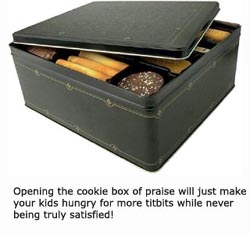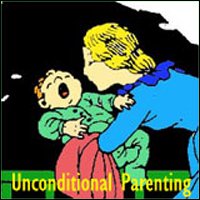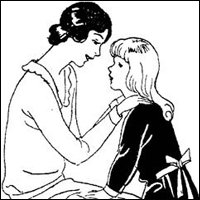Positive Reinforcement Parenting: Well-Meaning, But Lacking the Long Term Focus
• Even though I am Positive Parenting Ally, I'm not an uncritical advocate of
positive reinforcement parenting!
• See why and read more about the important difference between positive unconditional support and positive conditional praise!
What Is Positive Reinforcement Parenting?
I'll cut straight to the chase:Positive reinforcement is a modern, popular discipline technique aimed at bringing our kids' behavioral problems under quick control and getting our kids to do the things we want.
The method of reinforcement parenting is praising your kids when they do well (behave) and ignore the things they do wrong (when they misbehave).
The philosophy of positive reinforcement parenting is that praise will 'train' your kids to do 'good' things more often and 'bad' things less often.
So, what's wrong with this picture?
Surely a home with well-behaved kids that are happy to please their parents are every parent's dream, right?
What Do You Actually Want?
- A Carrot Craving Blinkered Donkey?
Sorry, I can be provocative but I got your attention, didn't I?Despite the rude and unflattering mental image in the above headline, I actually believe that reinforcement parenting advocates mean well, I really do!
I do believe that positive reinforcement advocates think that they've found the golden recipe for making both parents and kids genuinely happy.
However, in my opinion, positive reinforcement parenting has got more to do with fulfilling our own needs as parents (having compliant kids and therefore a more easy everyday life) than actually meeting our kids' basic emotional needs.
What the well meaning reinforcement parenting strategy does is giving conditional praise in the sense of: I will show you affection and positive attention if you live up to my terms!
If we cut right to the bone of the matter, positive reinforcement parenting is basically about getting children to do what we want by taking advantage of their dependence of our support and attention.
Reinforcement parenting is basically manipulation using praise as irresistible titbits to make our own life more easy!
Why the Praise Tactic Is Unsatisfactory in the Long Run!
All kids want and need to be seen and noticed but they don't (just like we adults don't) like to be judged, evaluated or measured.So how does praise differ from support?
Well, praise is basically a character judgment based on a person's actions.
In other words praise is conditional: "You're a good boy because you carried out your plate!"
Support is non-judgmental and aims at strengthening a person's sense of self.
Support is therefore unconditional - you pay attention to your kids but in a way that is non-judgmental of their actions.
In this way your kids will still feel seen but avoid the sense that they've 'earned' or 'worked for' your attention: "You carried out your plats. How did you open the door with your hands all full?"
The reward of conditional praise (admiration and approval) and positive reinforcement parenting is unfulfilling in the long run because:

- It only leads to your kids wanting more and more and more praise. In this way it's a vicious circle because the satisfaction of the praise is only temporary! Once the deed is done and the positive attention has withed, your kid has got to find another way to please you in order to get the much desired attention.
- Conditional praise can feel very shallow because your kid is being judged (as being good or bad) on the basis of his or her actions. What your kid really needs is feeling accepted and seen as the person he or she is - irrelevant of his or her actions
What Praise Actually Does to Our Kids!

- Stressful labelling. Constantly judging and measuring our children on the basis of their behavior is actually really stressful for them. They have to be on their marks all the time trying to sense what WE need.
Even for kids, our society today is filled with labelling (schools with grades and sports with winning and being the best) so wouldn't it be nice if the home was completely label free and our kids could just relax and be themselves? I think so!
- Making "praise junkies"(a great term borrowed from unconditional parenting expert Alfie Kohn).
Constantly seeking praise is a sort of pleasing sickness that may develop into the widespread status and achievement illness that we see so many adults suffer from in our western society.
They think that "If I work really hard to be the best in my field, I will be admired, be noticed and people will like me more!"
According human therapist Carl Rogers (the founder of the concept the unconditional positive regard, many people's need to seek constant approval and admiration stems from their childhood experiences with their parents.
As kids many of us got an unfortunate program installed in our head. This program controlled our actions because it made us believe that love had to be earned. We needed to be good to be accepted and approved of.
As adults this virus like program is still ruling our actions. We still believe that love and acceptance is something we have to 'work for'.
In this way reinforcement parenting is a 'candied' behavior control technique aimed at making kids work for love.
Positive reinforcement parenting is a politically correct way of manipulating our kids' behavior to make them do what we want.
In this way positive reinforcement parenting may end up reproducing the unfortunate achiever tendency in our society.
- Making kids abandon their true nature.
Being so busy trying to find out what we parents like so that they can do what is needed to get our praise, our kids might end up being untrue to their real interest.
For instance, a child may love to play noisily with cars all over the house but because the parents find it noisy or messy they over praise the kid's drawings to try to manipulate the child to engage more in this quiet activity.
This may lead to the kid trying to change himself to meet the parents' expectations in order to get the praise.
Later in life this approval seeking tendency may lead to the kid choosing to become a doctor (an admired profession) while secretly dreaming of being a pedagogue.
What To Do then?
- How Do We Support Our Kids Without Praising?
Because the praising habit lies so deeply in many of us, it is really difficult not to praise, I know. It's like an automated reflects.
Also, I know only too well the irresistible temptation of praising my son in order to get more of what I want. I'm no saint and I do slip sometimes.
But I do have some parenting guidelines that I try to live up to.
- Showing lots of spontaneous affection unrelated to specific actions or 'deeds'.
Just hugging, smiling, touching, bonding whenever I feel like it (which is often) or I sense that he needs it. - Let my kid discover his OWN feelings about something he's done by staying verbally neutral and not labelling.
It's not about ignoring my child but about letting my kid know that I've noticed.
This I do either by just describing the event: "You zipped you jacket!" or by repeating his own self supporting statement ("I did it myself"): "Yes, you did it by yourself!"
Also when I feel really tempted to praise something I try to ask a question instead of commenting and let my son provide me with HIS thoughts:
For instance, the other day my three year old son was drawing and for the first time there was head, two eyes and mouth. Before he was just doing really abstract Picasso lines!
I was so tempted to praise but that would've ruined not only the moment because he was having fun in the process of drawing but I would also have robbed him from liking the drawing just because he liked the drawing (vs. liking it because I praised it).
Instead I ended up asking him about the drawing: who is it, what's the person doing etc.
- Having a focus on concrete consequences or effects of his actions.
I try to avoid both being angry at screw-ups and praising good deeds.
For instance: If in a tantrum my son breaks something that I like, I try to tell him the effect of what he's done as neutrally but also as honestly as possible:
"When you broke that jug, it made Mom a little sad because Mom liked it because it was gift from an old friend. Also, we now scattered porcelain all over the floor which we have clean up. It will take us some time because the pieces are very sharp and we have to be sure to get it all so we don't step on it later.
Another example is making him notice the positive effects of his actions.
"Look at Simon's face. He's smiling and looks happy because you let borrow your bike."
Rather than praising my son "Good boy!" I'm directing his attention toward the effects of his actions and leaving myself and my labelling out of the picture.
I hope this article about positive reinforcement parenting and what is praise was useful to you.
If you want to read more parenting articles, you may continue your visit on my positive parenting website by choosing to read one or more of the articles below.
Your Positive Parenting Ally,
Birgitte

Want to stay in touch and get the latest news?
Sign up
for my free newsletter
Parent Coaching
- For Inner Peace, Clarity and a Deeper Connection to Your Child
 Being a parent can feel like a double-edged sword. Life with kids may feel like the greatest gift you have ever received, while at the same being hugely challenging, often leaving you confused, stressed and overwhelmed.
Being a parent can feel like a double-edged sword. Life with kids may feel like the greatest gift you have ever received, while at the same being hugely challenging, often leaving you confused, stressed and overwhelmed.
When we feel like this, we've lost touch with ourselves. We can't hear our own inner voice, and it's difficult to know what is 'right' for us and how to act.
I offer in-depth parent coaching to help you regain your balance and get back in touch with yourself. From a place of inner peace and clarity, your will find your own answers which will help you reconnect with your child from a place of unconditional love and acceptance.
Read more about my parent coaching here.
Where Would You Like to Go Next?
 Unconditional Parenting: Learn to Question Your Child Discipline Ideas to Really Meet Your Kid's Needs! |
 The Unconditional Positive Regard: The Long Term Parenting Strategy That Allows for Full Growth! |
 Alfie Kohn Biography, Theories and Books: The Father of Unconditional Parenting. |
 Carl Rogers Biography, Theories and Books: The Founder of Humanistic Psychology. |
Back to the top of this page about Positive Reinforcement Parenting: Well-Meaning, But Lacking the Long Term Focus
Go to the Positive Parenting Ally Homepage







